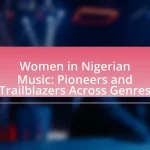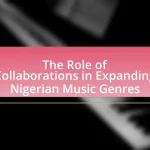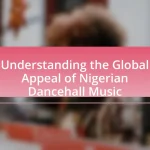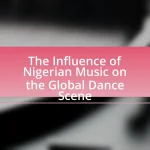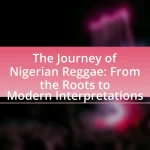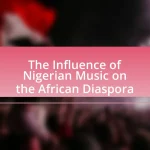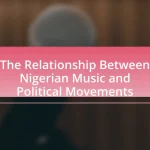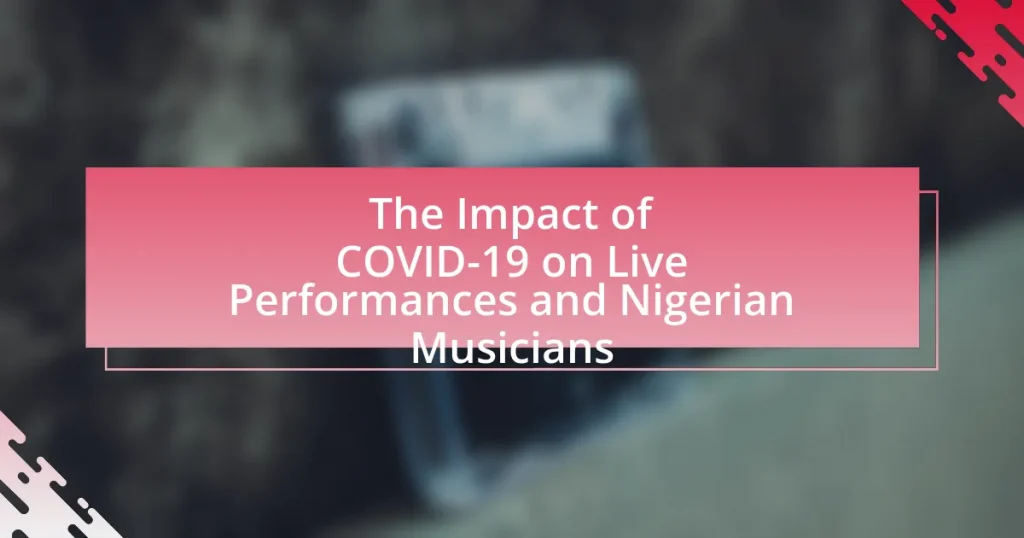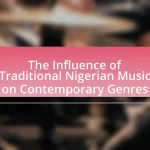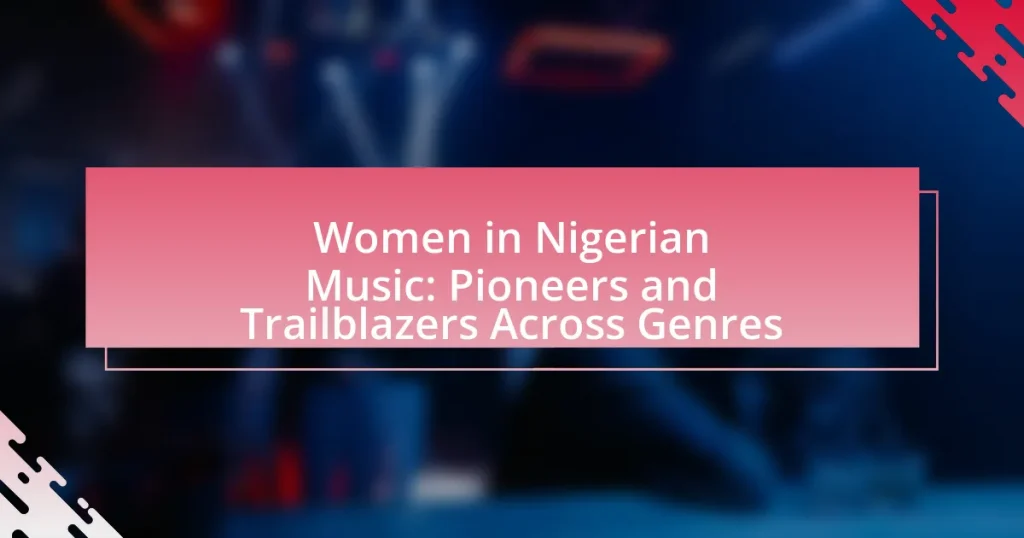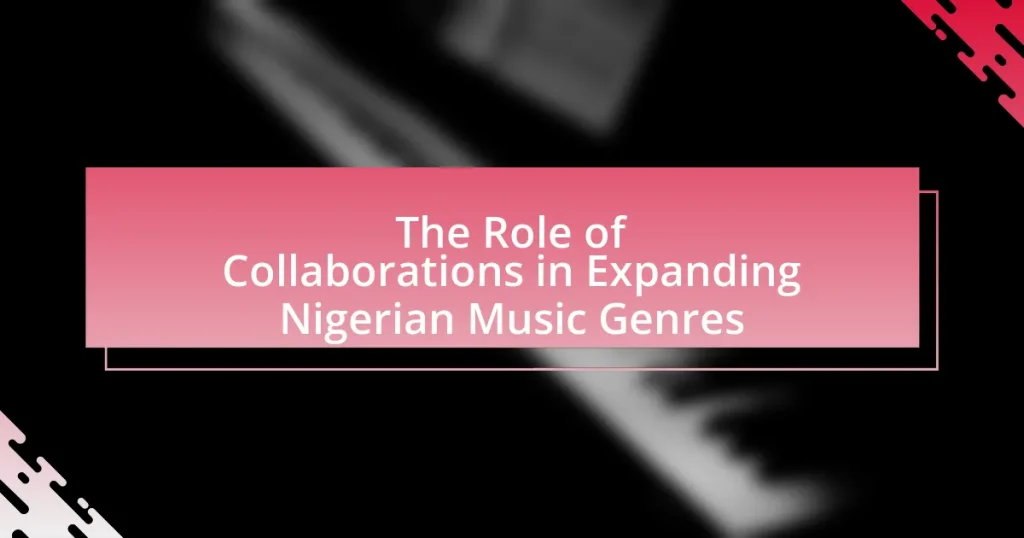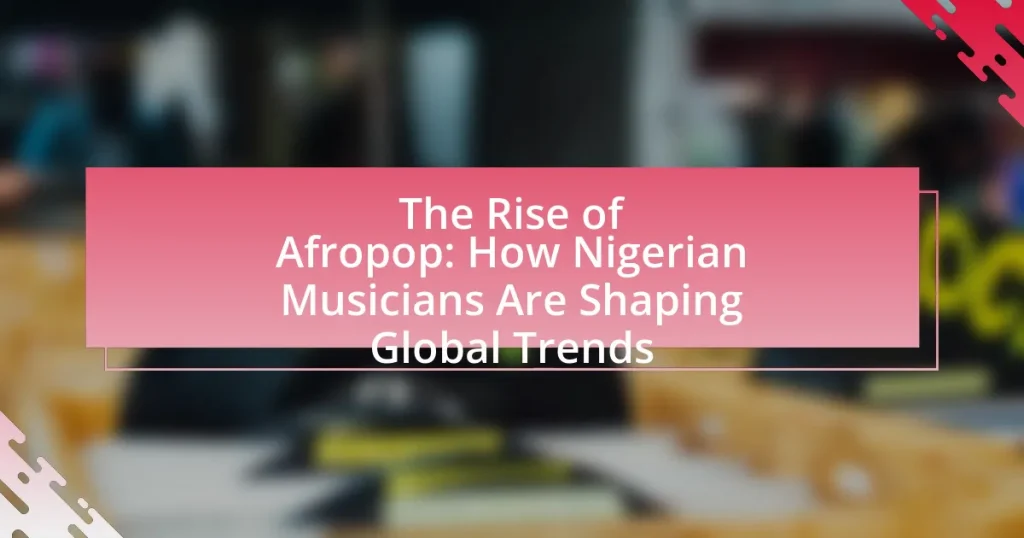The article examines the significant impact of COVID-19 on live performances and Nigerian musicians, highlighting the disruptions faced by the music industry due to health restrictions. It details the cancellation of events, financial losses for artists, and the shift towards virtual performances, which posed challenges for many musicians in accessing technology. The article also discusses the emotional and psychological effects on artists, the adaptations made in response to the pandemic, and the evolving landscape of live performances in Nigeria. Additionally, it explores government policies, audience behavior changes, and the future of live music, emphasizing the need for resilience and adaptability among musicians in the face of ongoing challenges.
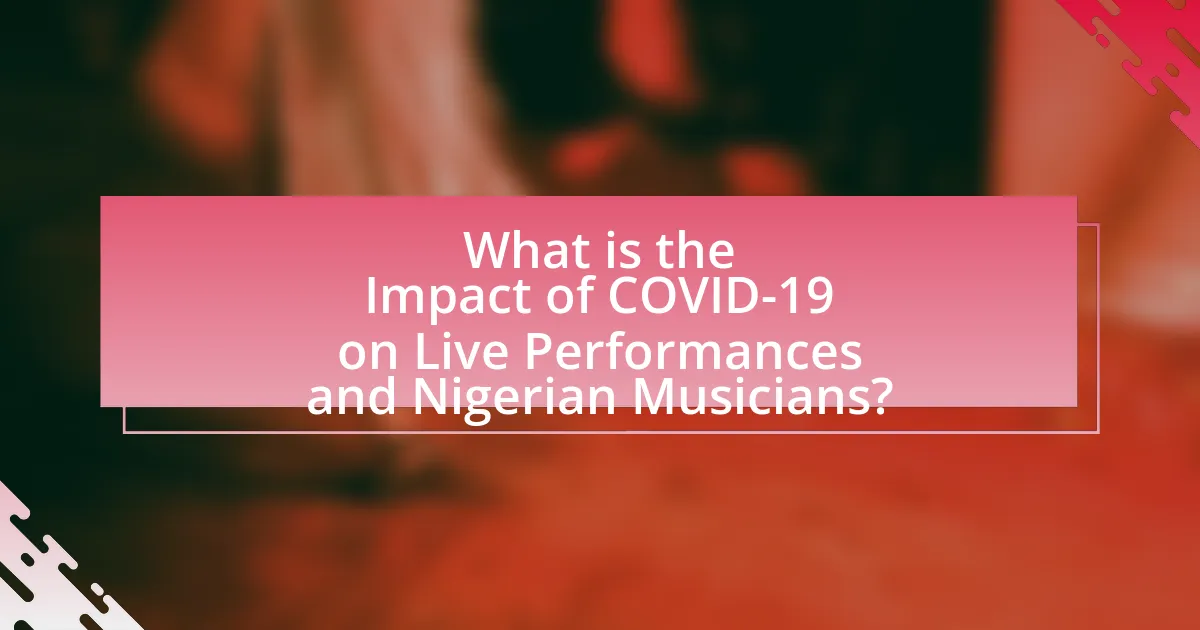
What is the Impact of COVID-19 on Live Performances and Nigerian Musicians?
The impact of COVID-19 on live performances and Nigerian musicians has been profound, leading to significant disruptions in the music industry. Live events were largely canceled or postponed due to health restrictions, resulting in a loss of income for many artists. According to a survey by the Music Industry Coalition, over 70% of Nigerian musicians reported a drastic decline in earnings during the pandemic. Additionally, the shift to virtual performances became a necessity, but many artists faced challenges in accessing technology and platforms to reach their audience effectively. This situation highlighted the vulnerability of the music sector in Nigeria, emphasizing the need for better support systems for artists during crises.
How did COVID-19 initially affect live performances in Nigeria?
COVID-19 initially led to the cancellation and suspension of live performances in Nigeria, significantly disrupting the entertainment industry. In March 2020, the Nigerian government implemented lockdown measures and restrictions on gatherings to curb the spread of the virus, which resulted in the closure of venues and the halt of concerts, festivals, and other live events. This abrupt cessation affected not only artists and performers but also the entire ecosystem surrounding live events, including event organizers, technicians, and support staff, leading to substantial financial losses and job insecurity within the sector.
What were the immediate consequences for concert venues and events?
The immediate consequences for concert venues and events included widespread cancellations and postponements, leading to significant financial losses. In March 2020, as COVID-19 spread globally, many countries implemented lockdowns and restrictions on gatherings, resulting in the closure of venues and the halting of live performances. According to a report by the National Independent Venue Association, 90% of independent venues in the United States faced closure within a few months due to the pandemic’s impact. This situation mirrored the experiences of concert venues in Nigeria, where events were also canceled, affecting local musicians and the entertainment industry.
How did the pandemic influence audience attendance and behavior?
The pandemic significantly reduced audience attendance at live performances, with many events being canceled or moved online. For instance, a survey conducted by the National Endowment for the Arts in 2020 indicated that 95% of arts organizations reported a decline in attendance due to COVID-19 restrictions. Additionally, audience behavior shifted towards virtual engagement, as many turned to online platforms for performances, leading to a 300% increase in viewership for live-streamed events compared to pre-pandemic levels. This shift reflects a broader trend of adapting to health guidelines while seeking entertainment, fundamentally altering how audiences interact with live performances.
What challenges did Nigerian musicians face during the pandemic?
Nigerian musicians faced significant challenges during the pandemic, primarily due to the cancellation of live performances and events. This disruption led to a substantial loss of income, as many musicians rely heavily on live shows for their earnings. According to a survey conducted by the Music Industry Coalition, over 70% of Nigerian artists reported a drastic decline in revenue during this period. Additionally, restrictions on gatherings and social distancing measures hindered collaboration and the production of new music, further impacting their careers. The pandemic also exacerbated existing issues such as inadequate infrastructure and limited access to digital platforms for monetization, making it difficult for musicians to adapt to the changing landscape.
How did financial instability affect musicians and their careers?
Financial instability significantly hindered musicians and their careers by limiting their income sources and opportunities for live performances. During the COVID-19 pandemic, many musicians faced canceled gigs and reduced revenue from streaming services, leading to financial distress. According to a survey by the Music Industry Research Association, 90% of musicians reported a loss of income due to the pandemic, which directly impacted their ability to sustain their careers. This financial strain forced many to seek alternative employment, reduce their artistic output, or even abandon their music careers altogether, illustrating the profound effect of economic uncertainty on the music industry.
What were the emotional and psychological impacts on artists?
The emotional and psychological impacts on artists during the COVID-19 pandemic included heightened anxiety, depression, and feelings of isolation. Many artists experienced a loss of income and purpose due to the cancellation of live performances, which significantly affected their mental well-being. Research conducted by the University of Edinburgh found that 70% of artists reported increased anxiety levels, while 50% experienced depression as a direct result of the pandemic’s restrictions on their work. This disruption not only impacted their financial stability but also their identity and connection to their audience, leading to a profound sense of loss and uncertainty about the future of their careers.
What adaptations did Nigerian musicians make in response to COVID-19?
Nigerian musicians adapted to COVID-19 by shifting to virtual performances and leveraging social media platforms for engagement. As live events were restricted, many artists began hosting online concerts and live streams, allowing them to reach audiences remotely. For instance, popular Nigerian artists like Burna Boy and Wizkid utilized Instagram Live to perform and connect with fans, maintaining their visibility and relevance during lockdowns. Additionally, musicians collaborated on digital projects and released new music through streaming services, which became crucial for sustaining their careers amid the pandemic’s challenges.
How did musicians leverage technology for virtual performances?
Musicians leveraged technology for virtual performances by utilizing live streaming platforms, social media, and digital audio workstations to reach audiences remotely. During the COVID-19 pandemic, many artists turned to platforms like Instagram Live, Facebook Live, and YouTube to broadcast performances, allowing them to maintain engagement with fans despite physical distancing measures. For instance, Nigerian musicians such as Burna Boy and Tiwa Savage hosted live concerts online, attracting thousands of viewers and generating revenue through virtual ticket sales and donations. This shift not only provided a means of income during lockdowns but also expanded their global reach, as audiences from different countries could participate in these performances.
What new revenue streams emerged for artists during the pandemic?
During the pandemic, artists developed new revenue streams primarily through virtual performances, merchandise sales, and crowdfunding. Virtual performances became a significant source of income as artists utilized platforms like Instagram Live, YouTube, and Zoom to reach audiences directly, generating ticket sales and donations. Merchandise sales also surged as artists capitalized on their online presence, offering exclusive items to fans. Additionally, crowdfunding platforms like Patreon and Kickstarter allowed artists to secure financial support from their fanbase, enabling them to sustain their careers despite the loss of live performance opportunities. These adaptations reflect a shift in how artists monetize their work in response to the challenges posed by COVID-19.
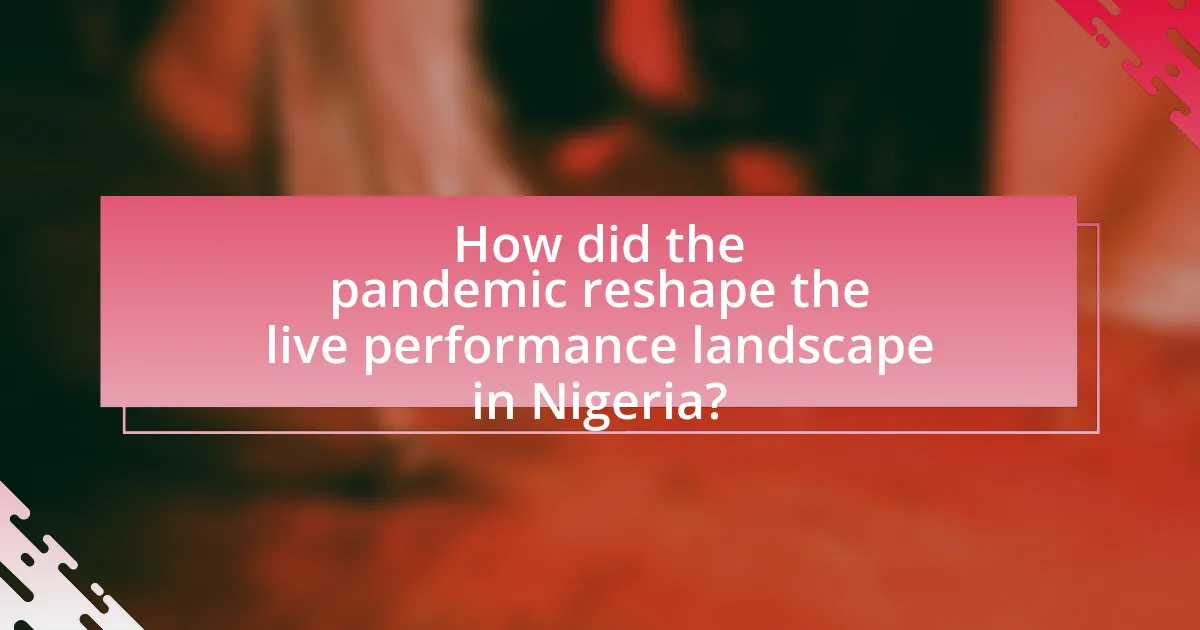
How did the pandemic reshape the live performance landscape in Nigeria?
The pandemic significantly reshaped the live performance landscape in Nigeria by accelerating the adoption of digital platforms for music and entertainment. As physical venues closed due to health restrictions, artists and promoters turned to online streaming services and social media to reach audiences, leading to a surge in virtual concerts and performances. For instance, in 2020, Nigerian artists like Burna Boy and Wizkid hosted successful live-streamed events, which attracted millions of viewers globally. This shift not only expanded the audience reach but also prompted a reevaluation of revenue models, as artists began to explore new monetization strategies through digital content.
What changes occurred in the types of performances offered?
The types of performances offered changed significantly due to COVID-19, shifting from traditional live events to virtual formats. Many Nigerian musicians adapted by hosting online concerts and live-streamed performances, which allowed them to reach audiences despite physical distancing measures. This transition was evidenced by the rise in platforms like Instagram Live and YouTube, where artists engaged with fans in real-time, showcasing their music while adhering to health guidelines. Additionally, the demand for recorded performances increased, as artists sought to maintain visibility and connection with their audience during lockdowns.
How did outdoor and socially distanced events gain popularity?
Outdoor and socially distanced events gained popularity primarily due to the COVID-19 pandemic, which necessitated safer alternatives to traditional indoor gatherings. As restrictions on large gatherings were implemented to curb virus transmission, event organizers adapted by moving activities outdoors, where the risk of infection was lower. This shift was supported by public health guidelines that encouraged outdoor interactions and social distancing, leading to a surge in outdoor concerts, festivals, and community events. For instance, a report from the National Independent Venue Association indicated that 70% of venues pivoted to outdoor events to comply with safety protocols while still engaging audiences.
What role did collaborations play in adapting to new performance formats?
Collaborations played a crucial role in adapting to new performance formats during the COVID-19 pandemic by enabling artists to combine resources, skills, and audiences. This synergy allowed Nigerian musicians to explore virtual platforms and hybrid events, which became essential as traditional live performances were restricted. For instance, collaborations led to the creation of online concerts and music festivals, such as the “One Africa Music Fest,” which showcased multiple artists and attracted global audiences, thereby maintaining engagement and revenue streams. These partnerships not only facilitated innovative content delivery but also fostered community resilience among artists facing unprecedented challenges.
How did government policies impact live performances during COVID-19?
Government policies significantly restricted live performances during COVID-19 by enforcing lockdowns, social distancing measures, and capacity limits. These regulations led to the cancellation or postponement of numerous events, resulting in substantial financial losses for artists and venues. For instance, in Nigeria, the government imposed a ban on gatherings, which directly affected concerts and festivals, causing a reported revenue decline of over 80% in the entertainment sector. Additionally, the implementation of health protocols limited audience sizes, further diminishing the viability of live performances.
What restrictions were placed on live events and gatherings?
Restrictions placed on live events and gatherings included limits on the number of attendees, mandatory social distancing, and the requirement of face masks. For instance, in Nigeria, the government imposed a ban on gatherings exceeding 20 people and mandated that venues maintain a distance of at least two meters between individuals. These measures aimed to curb the spread of COVID-19 and were enforced through various regulations and guidelines issued by health authorities.
How did government support initiatives affect musicians and the industry?
Government support initiatives significantly aided musicians and the industry during the COVID-19 pandemic by providing financial relief and resources. For instance, in Nigeria, the government launched the Creative Industry Financing Initiative, which allocated funds to support artists and entertainment businesses affected by lockdowns. This initiative helped musicians cover operational costs and sustain their livelihoods, thereby mitigating the economic impact of the pandemic on the music sector. Additionally, government grants and subsidies facilitated virtual performances and digital content creation, allowing artists to reach audiences despite restrictions on live events. These measures collectively contributed to the resilience of the music industry during a challenging period.
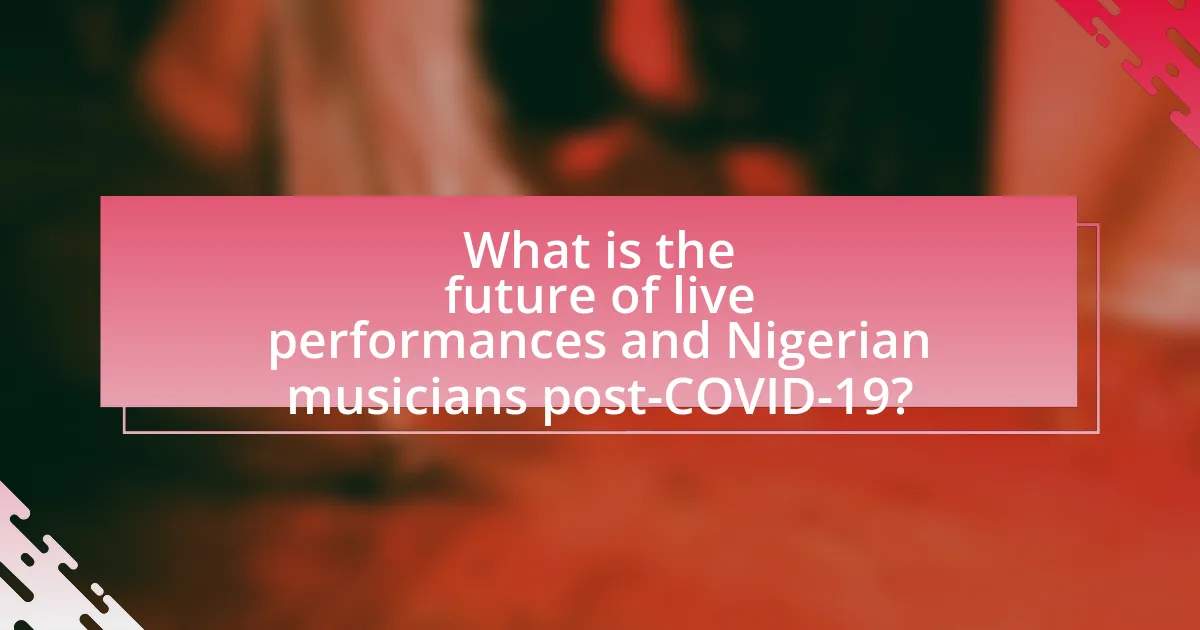
What is the future of live performances and Nigerian musicians post-COVID-19?
The future of live performances and Nigerian musicians post-COVID-19 is expected to see a significant resurgence, driven by increased demand for in-person events and the adaptation of digital platforms. As restrictions ease, live performances are anticipated to return with enhanced safety measures, allowing musicians to engage directly with audiences. According to a report by the International Federation of the Phonographic Industry, the global live music market is projected to recover, with a notable increase in ticket sales and attendance rates in 2022 and beyond. Nigerian musicians, who have increasingly leveraged social media and streaming platforms during the pandemic, are likely to continue blending live performances with digital experiences, expanding their reach and fan engagement. This hybrid model can enhance revenue streams and provide greater accessibility for fans unable to attend in person.
How have audience expectations changed for live performances?
Audience expectations for live performances have shifted significantly due to the COVID-19 pandemic, with a greater emphasis on safety, digital engagement, and immersive experiences. Audiences now prioritize health protocols, such as social distancing and sanitation measures, reflecting heightened awareness of health risks. Additionally, the rise of virtual concerts during lockdowns has led audiences to expect high-quality digital experiences, including interactive elements and accessibility to performances from home. Research by the International Live Music Conference indicates that 70% of audiences now value hybrid events that combine in-person and online participation, showcasing a demand for flexibility in how performances are delivered.
What new safety measures are likely to remain in place?
New safety measures likely to remain in place for live performances include enhanced sanitation protocols, social distancing guidelines, and capacity limits. Enhanced sanitation protocols, such as frequent cleaning of high-touch surfaces and availability of hand sanitizers, have been adopted widely during the pandemic and are expected to continue to ensure audience safety. Social distancing guidelines, which involve maintaining physical space between attendees, will likely remain to minimize the risk of virus transmission. Additionally, capacity limits, which restrict the number of attendees to reduce crowd density, are anticipated to persist as a precautionary measure. These measures have been implemented in various venues and events globally, demonstrating their effectiveness in promoting safety during live performances.
How might the experience of live music evolve in the coming years?
The experience of live music is likely to evolve through increased integration of technology, enhanced safety measures, and a shift towards hybrid events. As artists and venues adapt to post-pandemic realities, innovations such as virtual reality concerts and augmented reality experiences will become more prevalent, allowing audiences to engage with performances in immersive ways. According to a report by the International Music Summit, 75% of music industry professionals believe that technology will play a crucial role in shaping future live events. Additionally, health protocols will remain a priority, with venues implementing advanced air filtration systems and contactless entry to ensure audience safety. This evolution reflects a broader trend towards creating more inclusive and accessible live music experiences, catering to diverse audiences while maintaining the essence of live performances.
What lessons can Nigerian musicians learn from the COVID-19 experience?
Nigerian musicians can learn the importance of diversifying their revenue streams from the COVID-19 experience. During the pandemic, live performances were severely restricted, leading to significant income loss for artists who relied solely on concerts. This situation highlighted the need for musicians to explore alternative income sources such as digital streaming, merchandise sales, and virtual performances. For instance, a report by the International Federation of the Phonographic Industry (IFPI) indicated that global music streaming revenues increased by 19.9% in 2020, demonstrating a shift in consumer behavior towards digital platforms. By adapting to these changes, Nigerian musicians can build more resilient careers that are less vulnerable to external disruptions.
How can artists better prepare for future disruptions in the industry?
Artists can better prepare for future disruptions in the industry by diversifying their income streams and enhancing their digital presence. Diversification allows artists to reduce reliance on live performances, which can be significantly impacted by unforeseen events like pandemics. For instance, musicians can explore revenue from merchandise sales, online concerts, and streaming platforms. According to a report by the International Federation of the Phonographic Industry, global recorded music revenues grew by 7.4% in 2020, highlighting the potential of digital platforms. Additionally, building a strong online brand through social media and engaging with fans can create a loyal audience that supports artists during challenging times. This proactive approach equips artists to navigate industry disruptions more effectively.
What strategies can musicians adopt to enhance resilience and adaptability?
Musicians can enhance resilience and adaptability by diversifying their skill sets and embracing technology. By learning new instruments, genres, or production techniques, musicians can broaden their creative horizons and appeal to a wider audience. Additionally, utilizing digital platforms for live streaming and social media engagement allows musicians to maintain connections with fans and generate income despite restrictions on live performances. Research indicates that musicians who adapt to changing environments, such as the COVID-19 pandemic, by leveraging online tools and exploring alternative revenue streams are more likely to sustain their careers. For instance, a study by the International Federation of the Phonographic Industry (IFPI) highlights that artists who embraced digital strategies during the pandemic saw increased engagement and revenue opportunities.
What best practices can be implemented for successful live performances in the future?
To ensure successful live performances in the future, musicians and event organizers should prioritize health and safety protocols, including regular health screenings and vaccination requirements for attendees. Implementing these measures can significantly reduce the risk of COVID-19 transmission, as evidenced by studies showing that events with strict health guidelines have lower infection rates. Additionally, leveraging technology for hybrid performances, which combine in-person and virtual attendance, can expand audience reach and engagement, as demonstrated by the increased viewership of online concerts during the pandemic. Furthermore, enhancing audience experience through improved sound and lighting technology, as well as interactive elements, can elevate the overall performance quality, leading to higher satisfaction and repeat attendance.
